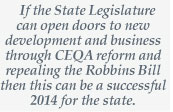By: Stuart Waldman
 December 31 is New Year’s Eve across the globe, but California elected officials, politicos and advocacy groups have another New Year’s Eve: Jan. 5, the day before the 2014 Legislative Session begins. December 31 is New Year’s Eve across the globe, but California elected officials, politicos and advocacy groups have another New Year’s Eve: Jan. 5, the day before the 2014 Legislative Session begins.
Likewise, those connected to Sacramento have their own lists of “New Session resolutions” that come back year in and year out. And, like your New Year’s resolutions, elected officials and stakeholders constantly think “this is the year” for their initiatives to actually succeed.
The Valley Industry and Commerce Association (VICA) hopes that this IS the year for a few extremely important initiatives:
Robbins Bill repeal
The “Robbins Bill” refers to a 22-year-old state Senate bill by former Senator Alan Robbins that prohibits light rail along what is now the Orange Line system. As a result, the current bus system was developed – and is now at double its intended capacity.
Since the creation of the Orange Line, Valley stakeholders have fought to repeal the bill so that more efficient transportation infrastructure can be studied and developed. Recently, the City of Los Angeles passed a resolution to support repealing the Robbins Bill, and VICA hopes the momentum of support continues up to Sacramento.
CEQA reform
Every year it seems the State Legislature gets a little bit closer to passing meaningful reform to the 40-year-old California Environmental Quality Act. Senate Pro Tem Darrell Steinberg carried a CEQA reform bill in 2013 that unfortunately did not address crucial problems with the legislation, including unnecessary environmental reviews and meritless lawsuits, a lack of transparency in CEQA litigation, weak plaintiff responsibility and a slow litigation process.
If other issues don’t capture the attention span of our legislators, then 2014 could be the year that moderate Democrats help make crucial CEQA reform a priority for the year.
On the other hand, VICA hopes that some of these business-unfriendly perennial bills go the way of those unused gym memberships:
Living wage mandates
Various industries have pushed for increasing minimum living wage levels, which means if a business is under contract with a city or receive some assistance from a city then the business must pay employees a wage sufficient to lift their families out of poverty. In the City of Los Angeles this is 11.07 for one adult and $23.53 if that adult has one child.
Legislators regularly introduce legislation to increase the state minimum living wage levels, but have not been successful in passing such policy. However, the Democratic supermajority voted in 2013 to increase the minimum wage from $8 to $10 by 2015, driving the minimum wage up very close to the minimum living wage in our area.
 We expect the momentum from this gives a living wage bill more traction, so it’s very important that businesses show their opposition to this job-killing policy. We expect the momentum from this gives a living wage bill more traction, so it’s very important that businesses show their opposition to this job-killing policy.
Soda and cigarette taxes
State legislators frequently attempt to increase revenues by taxing specific industries – and the soda and cigarette businesses are regular targets. A 2012 California ballot initiative aimed to tax cigarettes by an extra $1 per pack but the initiative failed. However, legislators continue trying to up the taxes instead of making necessary changes to the state budget, as shown by a failed bill in 2013 that would have upped the cigarette tax even more – an extra $2 per pack.
All it takes to make these “sin taxes” pass is the right mix of legislators willing to vote against the consumer’s right to choose how they spend their money. Business groups need to keep an eye out for legislation that hurts businesses under the guise of “consumer protection.”
Split-roll initiatives
We can always expect a legislator to introduce a split roll proposal, a misguided measure that eliminates the caps mandated by Proposition 13 on property tax increases for commercial properties and expands the definition for a “change of ownership” in commercial property.
Like sin taxes, this policy would add a quick $4 billion to $10 billion in extra property tax revenue – but it would also result in a total of $71.8 billion in lost output and 396,345 lost jobs over the first five years statewide.
If the State Legislature can open doors to new development and business through CEQA reform and repealing the Robbins Bill then this can be a successful 2014 for the state. If legislators instead slam these doors shut through split-roll proposals and sin taxes, then expect California to sink further.

|